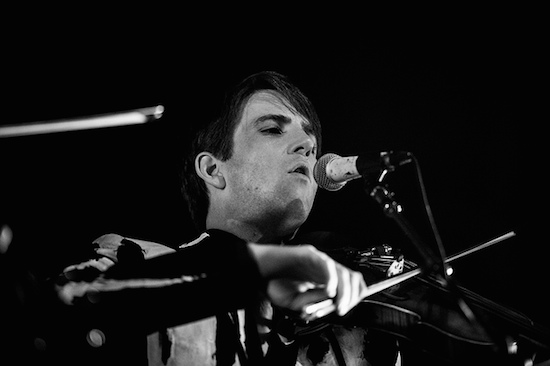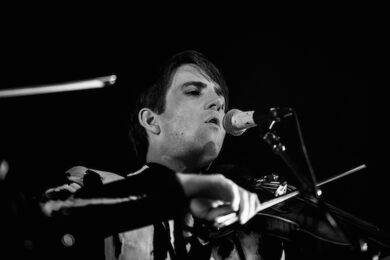It’s tempting, when any artist plays a purely instrumental set, to trot out well-worn musical clichés – "wall of noise" and "wall of sound" chief among them, the music press en masse apparently having some widespread perversion for that ever-present vertical construction (picture them all, now, in the dim light of the winter evening grinding up against the wall of your home with palpable sincerity) – let alone when the artist in question is someone like East India Youth, trading as he does so distinctly in the act of sonic landscaping; in the terraforming of any venue in to his own vision for an auditory universe. But "wall" in and of itself, particularly in this case, is a misnomer: it suggests something imposing and inherently uncommunicative, where, in reality, what William Doyle creates this evening is not only all-encompassing – enveloping rather than obstructing – but also reflective. Like one of Rothko’s great canvases, each universes of their own, large and opaque enough themselves to be called walls, these pieces of music exist as much to be populated by the projections of the listener here and now at the Southbank Centre as for the perhaps now too-well-documented cathartic purposes of Doyle himself in creating them.
While it is true that this would likely be – and, indeed, has been – as much the case with most any East India Youth set on any other given night (and in its more widely recognised form; Doyle, alone, building momentum as a singularity with palpable physical entropy), this evening, playing with the added textural benefits of Thomas Gould’s Aurora Sextet and a great deal of improvisation, these qualities are only intensified. Playing only the waxing/waning ‘TOTAL STRIFE FOREVER’ pieces from this year’s album of the same name, the live string and wind instrumentations add not only to the more euphoric soaring elements of those tracks but also lends a further gravity to their more darkling moments: as much Enter The Void as Lost In Translation. Or the only good bit of Equilibrium, where, waking from a dream, Christian Bale peels the plastic from his window and tearfully, graspingly lets in the light.
Yes, the whole thing could have been longer and the bass could, probably should, have been louder – but these are technicalities – and what we have in this evening is a crystal ball of sorts: a hint at what Doyle might achieve, what he might come to create, as his work becomes more complex, more involved and more expansive than the one man band allows.
While far from the scale of Spinal Tap’s half-inflated Dark Lord, Owen Pallett and his two-piece band are supported on stage by a single piece of scenery: a 3D crystal of sorts – the kind you find in cavernous spaces, deep underground, via Roger Hiorns in a derelict London flat, or in a Lego Aquasharks box set of old, rather than around the neck of the socially mobile.
It isn’t grandiose or brash, but modest and unobtrusive – the reflective monolith presents itself as a righteous accompaniment to Pallett’s music: its myriad faces seemingly designed to catch the light in such a way as not only to be ‘pretty’ in an idle, vegetative, sense but also to create the illusion of movement; the natural blossom of the crystalline structure as mirrored in the staccato violin and the soar of the keys that so defines Pallett’s sound; not in conflict, but complimentary.
In media res: Owen Pallett is nothing short of extraordinary this evening, not only in terms of the songs he chooses to play (and the way that he and his band play them) but also in terms of personal presence – the tangible warmth and generosity he exudes when he performs.
Opening not with a track from 2014’s In Conflict, but rather from 2005’s Has A Good Home, written under Pallett’s retired Final Fantasy moniker, is just one example of the latter. ‘That’s When the Audience Died’ has as much of a place on the stage as any other piece of music played this evening and does not jar even as it abdicates to the contemporary in the form of ‘Song For Five & Six’: if anything, the song’s vocal reprise ("the sun has set on me") is a knowing nod to Pallett’s musical history – the death of Final Fantasy as nom de plume and birth of Owen Pallett as an eponym in which we, as listener, are complicit.
Though the set-up has remained much the same – his violin and the storytelling idiosyncrasy of the lyrics still very much at the forefront of those songs from In Conflict as with the earlier material – there are things that have changed about Owen Pallett over the years.
Firstly, and perhaps most importantly, in a brief tuning interlude-cum-spontaneous audience Q&A, it is made apparent that while he’s still no good at chin-ups Pallett is killing it on the press-ups; perhaps the only thing he shares with Simon Cowell.
Pectorals aside, it’s the quality of Pallett’s voice that seems most evolved; possessing a new strength where once there was a thinner, reedy quality. Not only is there measurable technical prowess, but also a sense of real conviction; when the Aurora Sextet take their places on stage to play their parts on ‘The Passions’ they lend – or, rather, exacerbate – an atmospheric, brooding timbre. But the extraordinary depth comes from Pallett himself; a confidence without ego, vulnerable but assured.
<div class="fb-comments" data-href="http://thequietus.com/articles/16976-live-report-east-india-youth-owen-pallett” data-width="550">



